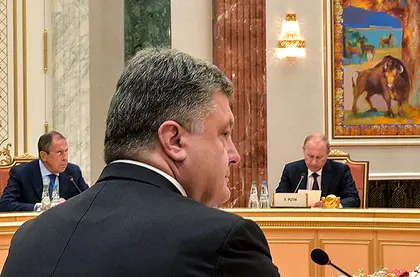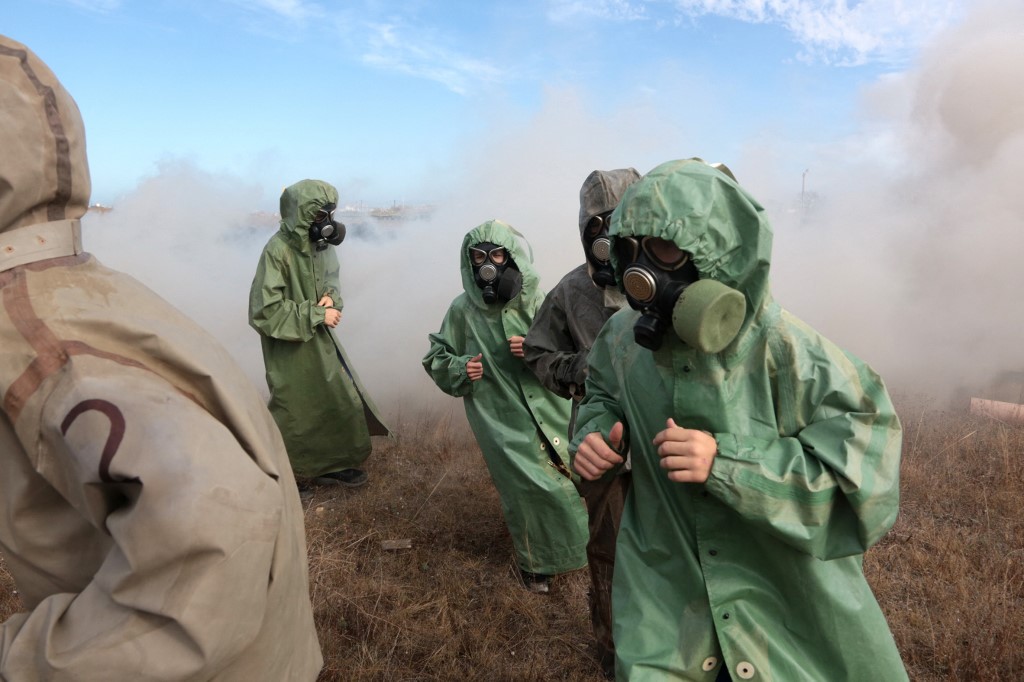Poroshenko made many promises during his extensive campaign trips, but has failed to keep several of them. It has not eroded his support so far, however. Some 57 percent of Ukrainians still support their president, according to the latest findings of the pollster Research & Branding Group published on Aug. 15.
The Kyiv Post has revisited some of the election promises ahead of Poroshenko’s three months in power since his June 7 inauguration.
JOIN US ON TELEGRAM
Follow our coverage of the war on the @Kyivpost_official.
Promise: “I will nominate my team the day after inauguration”
Status: failed
On his campaign trail, Poroshenko was very secretive about the team he planned to work with, but never stopped repeating that he will nominate his team “the day after inauguration, possibly on the land of Donbas.”
But the first major appointments were not made until June 10, when Borys Lozhkin, Poroshenko’s former business partner, was named chief of the president’s administration.
Oleksiy Haran, a political expert and professor at Kyiv Mohyla Academy, says it’s OK because the president “should spend some time trying to find out who will work out for him.” But the president has been taking his time filling key vacancies in the Cabinet, presidential administration and the National Security and Defense Council.
So far, he has failed to fill some key vacancies, the most prominent of which is the job of secretary of the National Security and Defense Council
Poroshenko did make a number of appointments to the Presidential Administration and appointed some members of the Cabinet that fall under his competence. Most prominently, he nominated Pavlo Klimkin as foreign minister and Valeriy Heletei as defense minister.
He also appointed Valeriya Gontareva, former Investment Capital Ukraine board chairperson, as governor of the National Bank of Ukraine. Gontareva became the first woman in Ukraine’s independent history to become a chief banker. One of EuroMaidan Revolution activists and volunteers, Yuriy Biryukov, also made it to the presidential pool. He was appointed the president’s adviser on Aug. 13.
Haran says that this time the Presidential Administration “keeps a low profile, which is good – because it’s only a support service of the president.”

Promise: “Anti-terrorist operation cannot and will not last two or three months. It has to, and will, last hours.”
Status: failed
During his first press conference after the election vote on May 25, Poroshenko said that the anti-terrorist operation will last hours. It has been three months, and a new front just opened in eastern Ukraine as Russian soldiers crossed the border in southern Donetsk Oblast and took over the town of Novoazovsk just days ago. Large parts of Donetsk and Luhansk oblasts still remain under separatist control, while the death toll of Ukraine’s army is running over 700 soldiers. The United Nations estimates that 2,200 civilians died in clashes.
The country’s anti-terrorist operation was initially announced in mid-April.
Haran, the professor at Kyiv Mohyla Academy, believes that the situation may have been different had Russia not decided to openly invade Ukraine. “Nobody expected then Russian government would send its (humanitarian) convoy to Ukraine and then keep sending its forces in Ukraine,” Haran explained.
Two weeks after the inauguration, Poroshenko announced a unilateral ceasefire by the government forces as a part of a peace plan. The president was calling on Russia-backed insurgents to put down the arms. But during the 10-day ceasefire the casualties in Ukraine’s army actually went up as militants opened fire at Ukrainian forces more than 108 times, killing at least 28 servicemen, according to official figures. They also shot down a Ukrainian military plane, and all 49 passengers of that plane died.
As of Aug. 28, armed insurgents backed by Russian regular troops keep the number of strategic cities, including Ilovaisk, Amvrosiivka, Starobesheve and Novoazovsk in Donetsk Oblast.
Promise: Full reboot of power
Status: partially fulfilled
The promise of a full reboot of power was one of the key points of Poroshenko’s presidential program.
“I will provide a power reboot and make every effort within the constitutional powers and announce parliamentary elections by the end of 2014, based on the proportional representation of the political parties,” reads Poroshenko’s program.
After the Independence Day celebrations, Poroshenko announced that he set an early parliamentary election for Oct. 26. In his speech Poroshenko stressed he was issuing his decree “taking into account the expectations of the majority of Ukrainians and trying to keep my own word, which I gave while running for president.”
But the original promise was to conduct parliamentary elections based on new rules and a proportional system, where parties would create election lists of their candidates in a open and transparent manner.
However, the Oct. 26 vote will be based on the existing parallel system, where each resident gets two ballots to vote. One of the ballots will offer a list of parties, who will have created their lists of candidates behind closed doors. The other ballot will offer a list of candidates specific for each of the 226 majority constituencies in Ukraine. It’s still unclear what will happen in the annexed Crimea and in the war zone in the east.
Promise: To sell business (except for Channel 5) in case of presidency
Status: pending
Poroshenko, the country’s 18th richest man, whose wealth Forbes estimates at $1.3 billion, this month has picked an agent to sell off his significant business assets. His interests will be represented by Rothschild & Cie Investment Company, according to Giovanni Salvetti, co-chairperson of the company, who spoke to Radio Free Europe/Radio Liberty.
“We’re very delighted to be selected for this important mission (selling Poroshenko’s assets),” Salvetti said in a televised interview. He said that the company will team up with their Ukrainian counterparts, Investment Capital Ukraine and promised on Aug. 21 that “the effective work on selling (Poroshenko’s) business will start the next week.”
Investment Capital Ukraine is the company that used to be co-owned by Gontareva, the National Bank governor, before her appointment by Poroshenko on June 19. She had to sell her business assets after the appointment.
Apart from an international candy empire Roshen with a turnover of $1.021 billion last year, according to Candyindustry.com, a specialized website, Poroshenko owns assets in automobile, shipbuilding, real estate and agriculture. He also owns Channel 5, which he refuses to tell for sentimental reasons.
Promise: “All the soldiers will be paid Hr 1,000 per day starting May 26”
Status: failed
“The soldier of Ukraine will no longer be naked, barefoot and hungry. He has to be well paid, his life has to be insured,” Poroshenko said in his speech on election day.
He promised to make improvements of the Ukrainian army his top priority. He said he would raise what servicemen make from $50 a month to $83 a day, and that each volunteer would get a life insurance worth $83,000.
However, the soldiers who take part in the country’s unfolding anti-terrorist operation, still earn Hr 5,700 ($424) per month, according to the deputy Defense Minister Petro Mekhed.
Kyiv Post staff writer Olena Goncharova can be reached at [email protected]
You can also highlight the text and press Ctrl + Enter




